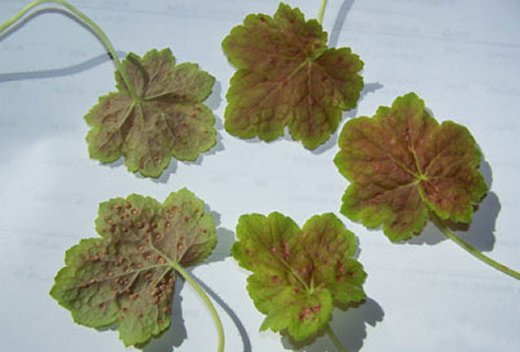HEUCHERA RUST
Heuchera Rust is a relatively new problem in the UK, first identified in 2004. It has quickly become far more common over the last decade. It is a strain of fungal rust which affects only heucheras and is properly called Puccinia hucherae. To date, it has not been known to affect any other plants.
SYMPTOMS OF HEUCHERA RUST
The symptoms of Heuchera Rust are:
- Initially small sunken or raised areas on the upper surface of leaves. The areas are normally brown
- The underside of leaves will have raised, rust coloured spots on them
- The raised spots may well also appear on the stems and upper sides of the leaves
- Badly affected leaves will be distorted, the raised areas may fall out leaving small holes in the leaves
- Older leaves are more affected compared to new growth
Heuchera Rust on upper and lower leaf surfaces
LIFE CYCLE OF HEUCHERA RUST
Two factors make Heuchera Rust relatively easy to control. The first is that it cannot affect other plants and neither can rust on other plants affect Heucheras. The second is that, in common with other types of rust, it needs live plant material live.
Understanding the life cycle of a pest or disease is key to working out how to defeat it. The life cycle of Heuchera Rust is described below.
MID SPRING TO EARLY SUMMER
When temperatures begin to rise in mid spring to early summer rust spores are released from infected living plants which land on other plants and infect them. The ideal temperature range for spore release and germination is 10°C to 20°C / 50°F to 68°C although it will still occur outside of these ranges. Spores are transferred by wind and rain drops.
EARLY SUMMER TO LATE AUTUMN
When the spores land on a suitable plant they germinate. Rust fungus then infects the new plant and begins to feed on it. The time between the spores infecting a plant and the visible signs of the infection appearing can be as short as a week but as long as a month. It all depends on the temperature and humidity levels.
It’s important to realise that infected plants may not always show immediate signs of infection. The infection easily spreads form one part of the plant to another (and to nearby plants) over the summer and autumn.
WINTER
In winter, as the temperature falls, the infection rate slows down, the fungus effectively overwinters on infected living plants.
PREVENTING HEUCHERA RUST
Several steps can be taken to minimise the risk of your plants suffering from Heuchera Rust. These are set out below:
- Remove any leaves or stems which are dying or in bad condition. Older leaves are more prone to Heuchera Rust
- Clear up all decaying matter around your plants. Well rotted organic matter as a mulch is fine however because it contains only dead plant material which cannot support the growth of rust
- Don’t crowd your plants. This reduces airflow which in turn increase the risks of rust – rust thrives in cool conditions with restricted airflow
- Rust prefers lush foliage and this is encouraged by the application of nitrogen rich fertilisers so do not use on heucheras, they do not need them
HOW TO TREAT HEUCHERA RUST
If the infection is minor we would suggest removing all leaves which are affected and then spraying with a fungicide such as Bayer Fungus Fighter Plus or Scotts Fungus Clear Ultra.
The other more certain alternative is to remove all leaves, infected or not, making sure not to remove the growing point. It’s safest to remove the leaves one by one. This will leave your heuchera looking very bare for a few weeks but almost certainly it will recover and produce new leaves.
Heucheras are very resilient plants and will easily pull through the treatment recommended above. Half measures are rarely effective in the long term so pluck up the courage to obtain the best result. Make sure you either burn the leaves or put them in the domestic rubbish bin (not a compost bin).

COMMENTS / QUESTIONS LEFT BY OUR READERS
ANSWER: Awaiting your question or comment
WHY NOT LEAVE YOUR QUESTION / COMMENTS ABOUT THIS PAGE?
ENTER THEM BELOW. EMAIL ADDRESS IS OPTIONAL.
YOUR COMMENTS WILL BE ADDED ABOVE WITHIN A FEW HOURS.